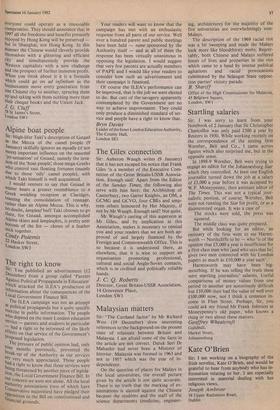Startling salaries
Sir: I was sorry to learn from your Notebook of 2 January that Sir Christopher Chancellor was only paid £300 a year by Reuters in 1930. While working recently on the correspondence of the mining firm Wernher, Beit and Co., I came across figures which also surprised me, but in the opposite sense.
In 1898-9 Wernher, Beit were trying to engage an editor for the Johannesburg Star which they controlled. At least one English journalist turned down the job at a salary of £3,000 a year before it was accepted by W.F. Moneypenny, then assistant editor of The Times. This was not a typical jour- nalistic postion, of course; Wernher, Beit were not running the Star for profit, or as a disinterested organ. It was a case of
The stocks were sold, the press was squared.
The middle class was quite prepared.
But while looking for an editor, an emissary of the firm went to see Harms- worth — Northcliffe to be — who 'is of the opinion that £3,000 a year is insufficient for a first-class man who [and who says that he] gives two men connected with his London papers as much as £1 0,000 a year each'.
Harmsworth may have been big- mouthing. If he was telling the truth these were startling journalists' salaries. Useful comparisons of money values from one period to another are notoriously difficult but £10,000 then had the value of well over £100,000 now, not I think a common in- come in Fleet Street. Perhaps, Sir, you could ask my friend Mr Frank Johnson at Moneypenny's old paper, who knows a thing or two about these matters.
Geoffrey Wheatcroft
Guildhall, Market Street, Johannesburg


































 Previous page
Previous page